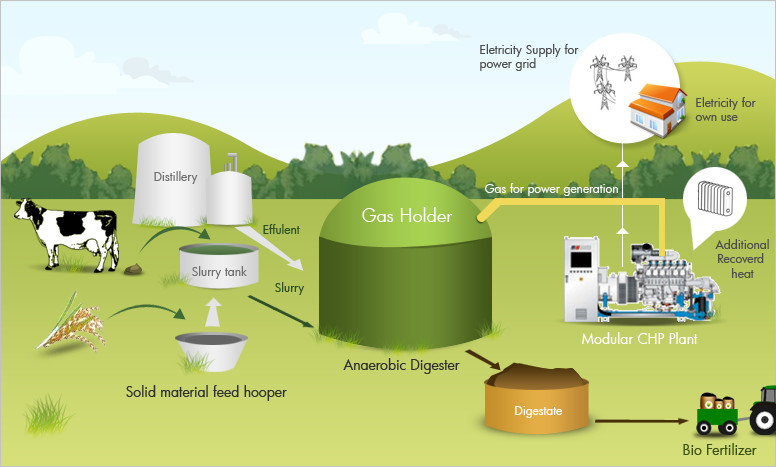BIO-GAS PRODUCTION & DISTRIBUTION
We are dedicated to producing clean, renewable energy through the process of bio-gas production. Bio-gas, primarily composed of methane, is generated from the anaerobic digestion of organic waste. This sustainable energy source helps reduce greenhouse gas emissions, manage waste effectively, and provide an alternative to fossil fuels.

Bio-Gas Production Process:
- Organic Waste Collection: We gather organic waste from various sources, including agricultural residues, food waste, and animal manure. This helps in managing waste effectively and preventing it from ending up in landfills.
- Anaerobic Digestion: The collected organic waste is fed into anaerobic digesters, where microorganisms break down the material in the absence of oxygen. This process produces bio-gas and digestate, a nutrient-rich byproduct.
- Bio-Gas Refinement: The raw bio-gas undergoes purification to remove impurities, resulting in a high-quality fuel that can be used for various energy applications, such as electricity generation, heating, and as a vehicle fuel.
Environmental Benefits:
- Reduction in Greenhouse Gas Emissions: By capturing methane emissions from organic waste, we prevent a potent greenhouse gas from being released into the atmosphere. Using bio-gas as an energy source also reduces reliance on fossil fuels, further lowering carbon emissions.
- Waste Management: Bio-gas production provides a sustainable solution for managing organic waste, reducing the need for landfilling and minimizing environmental pollution.
- Soil Enrichment: The digestate produced during the anaerobic digestion process is rich in nutrients and can be used as an organic fertilizer, enhancing soil health and promoting sustainable agriculture.
Economic and Social Benefits:
- Job Creation: Our bio-gas production operations create employment opportunities in waste collection, plant operation, and maintenance, contributing to local economic development.
- Energy Security: Bio-gas offers a renewable and reliable source of energy, enhancing energy security and reducing dependence on imported fossil fuels.
- Support for Agriculture: By providing a market for agricultural waste and offering organic fertilizers, we support local farmers and promote sustainable farming practices.
Innovative Technologies:
- Advanced Digesters: We use state-of-the-art anaerobic digesters that maximize bio-gas yield and efficiency. Our technology ensures optimal conditions for the microbial breakdown of organic waste.
- Bio-Gas Upgrading: Our purification systems remove impurities from raw bio-gas, resulting in high-quality, clean bio-gas suitable for various energy applications.
- Distribution Networks: We develop infrastructure for the efficient distribution of bio-gas, ensuring that this renewable energy source reaches residential, commercial, and industrial users.
